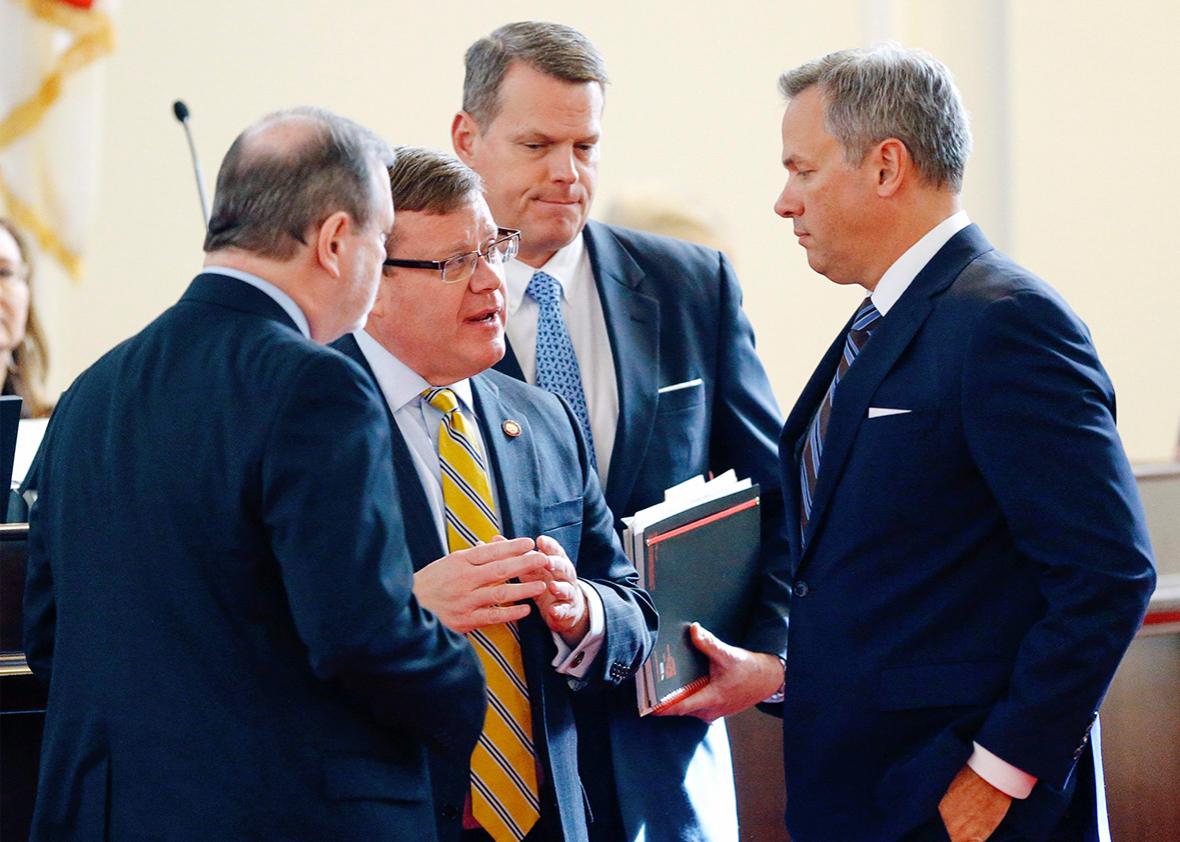After the Supreme Court struck down key portions of the Voting Rights Act, an almost uncontested North Carolina GOP—with firm control of the governor’s office and legislature following the 2010 and 2012 elections—clamped down on voting rights in the state. It targeted black Americans with strict ID requirements, it used county election boards to shutter polling places in precincts where blacks and students voted, it purged eligible Democratic-leaning voters from the rolls, it ended same-day registration and slashed early voting, it gutted public financing for judicial elections and worked to protect incumbent GOP judges from voter accountability, and it gerrymandered Democratic-leaning counties to create almost impregnable majorities.
In short, it used the power of the state to protect itself from the voters of the state. But that wasn’t enough. Last month, after a fierce and contentious battle, Democrat Roy Cooper won a narrow victory over incumbent Gov. Pat McCrory, backed by a coalition of blacks, liberal whites, LGBT voters and their allies, and other groups targeted by Republican lawmakers. Come January, Democrats will have the executive power to begin to roll back Republican actions. This is how politics works. Elections have consequences.
Except that North Carolina Republicans may not agree. On Wednesday, using an emergency session for disaster relief, the GOP-led state legislature pushed measures that would severely curtail and limit the power of the office of the governor, just a few years after voting to expand its authority. One bill would eliminate some executive appointments, subject Cabinet appointments to state Senate approval, and remove the governor’s power to appoint trustees to the university system and state board of education, both vectors for Republican influence under McCrory. Another bill would add another seat to state election boards and require partisan balance, a “neutral” measure that uses gridlock to keep Democrats from reversing GOP actions on voting and ballot access.
To call this a coup evokes violence and disorder, but in a certain sense, that is what voters in the state face: an attempt to overturn the election through legislative means. A new nullification crisis.
What makes this so striking, beyond the obvious, is that it echoes and emulates an earlier band of North Carolina reactionaries, who also targeted black voters and tried to end democracy in the state rather than share it with their opponents. Today’s North Carolina GOP shares a name with the Republican Party that united black Americans and Unionist whites for a short time in the Reconstruction South. But its DNA seems to belong to the coalition that crushed that experiment.
For most of the late 19th century, North Carolina was firmly in the hands of a reactionary, white supremacist Democratic Party. In 1870, backed by the Ku Klux Klan and its campaign of violent terror, those Democrats captured the legislature and impeached the state’s Reconstruction governor, Republican William Holden. Over the next decades, they would use a combination of violence, intimidation, and legislative action to disenfranchise black North Carolinians and establish virtual one-party rule across all levels of government.
But then came a nationwide depression, and a new alliance of white farmers united under the Populist banner. In North Carolina, this split between white farmers and white industry opened new space for political action. The Populists, a minority force, saw fruit in an alliance with black Republicans. In turn, black North Carolinians saw “fusion” with the Populists as the vehicle for pushing Democrats out of power. And that’s what they did. In 1894, the Fusion Party alliance won control of the state legislature. In 1896, it won the governorship. It restored local control to towns and cities, empowering black voters and toppling white domination.
The Democrats responded viciously. Armed militias terrorized black Republicans and white Populists, and an anti-Fusion popular press spun stories of black fraud, black corruption, and “Negro domination.” If Populists fractured the Democratic coalition by emphasizing class tensions, Democrats fractured the Fusion one by emphasizing color caste and white supremacy. They tied it to an economic appeal: Blacks have taken your jobs, and ending Fusion will restore your prosperity. A violent coup in Wilmington—deposing black leadership and driving black workers and artisans out of the city—cemented the new status quo. By 1900, Democrats had the legislature and the governorship once again. And in short order, they raised new barriers, disenfranchising black North Carolinians and blocking Fusion from resurgence.
The Republican Party of North Carolina in 2016 isn’t avowedly white supremacist or openly opposed to the participation of black Americans and other disfavored groups. It isn’t a replica of that older iteration of the Democratic Party. But in this age of backlash, it has been captured by a similar spirit of reaction and illiberalism. And while the aims are different—partisan control for right wing, ideological reasons—the means are very familiar: disenfranchisement of blacks, attacks on the machinery of elections, insinuations of fraud, attempts to usurp the voters themselves.
The trouble is that if this spirit of nullification and white tribalism—this spirit of Confederacy—has captured the former party of Lincoln, then history suggests its hold may last for decades. Jim Crow government held sway until the 1960s, when it fell in the wake of the Civil Rights movement and our second Reconstruction. If unchallenged, disenfranchisement works. And under President Donald Trump, there’s little chance of challenge; soon the federal office tasked with protecting voters will be held by a man who supports the effort to suppress the vote.
If the events in North Carolina are a sign of things to come—and if the actions, behavior, and rhetoric of President-elect Trump are any indication—then this Republican Party isn’t just a threat to Barack Obama’s legacy or broader liberal aspirations. It could be the beginning of a decadeslong fight for American democracy itself.
